Dubai: Friday, May 7, 2021 was a gloomy day for the family of Ramachandran. K, who lives in Kozhikode district of the southern Indian state of Kerala.
The sky was overcast and there was a pall of gloom hanging over the family on the day that marked a year after Ramachandran’s his daughter-in-law Athira Geetha Sreedharan reached home from the UAE on the first day of India’s COVID-19 repatriation drive — Vande Bharat Mission (VBM).
Dubbed as the largest repatriation drive, VBM saw millions of stranded Indians across the world flying home due to the impact of the COVID-19 pandemic. It also saw the crash of an Air India Express repatriation flight from Dubai to Kozhikode (IX1344), that claimed the lives of 21, people including two pilots, three months after the repatriation mission began.
In this past year, VBM facilitated the journey of more than 8.3 million people during the time of crisis, according to India’s Civil Aviation Minister Hardeep Singh Puri.
As of January 21, as many as 1.3 million passengers had travelled from the UAE to India, India’s Minister of State for External Affairs and Parliamentary Affairs V. Muraleedharan had said. During his visit to the UAE, the minister added that almost 1.15 million passengers had also returned to the UAE following an air bubble agreement. Inbound travel from India has recently been suspended due to the alarming surge in the COVID-19 cases there.
Though not stranded any more, Indians continue to travel home from the UAE. However, the numbers are smaller due to the reversal in the pandemic situation compared to last year. Yet, 1,665 of 3,103 passengers, who flew to India from across the world on Thursday, were from the UAE, according to the figures released by the Civil Aviation Ministry.
But what happened to those who went back home during the first phase of VBM — those who had to fight for repatriation flights and wait for their turns after registering with the Indian missions in the UAE? Here is what they shared when Gulf News revisited some of the Indians whose repatriation stories were featured by us.
Athira’s tragic story
Athira, 27, was one of them. She had, in fact, become the face of the stranded Indian expats, who sought repatriation due to various reasons, after she hit the headlines for filing a writ petition in India’s Supreme Court, seeking help to return home for her delivery.
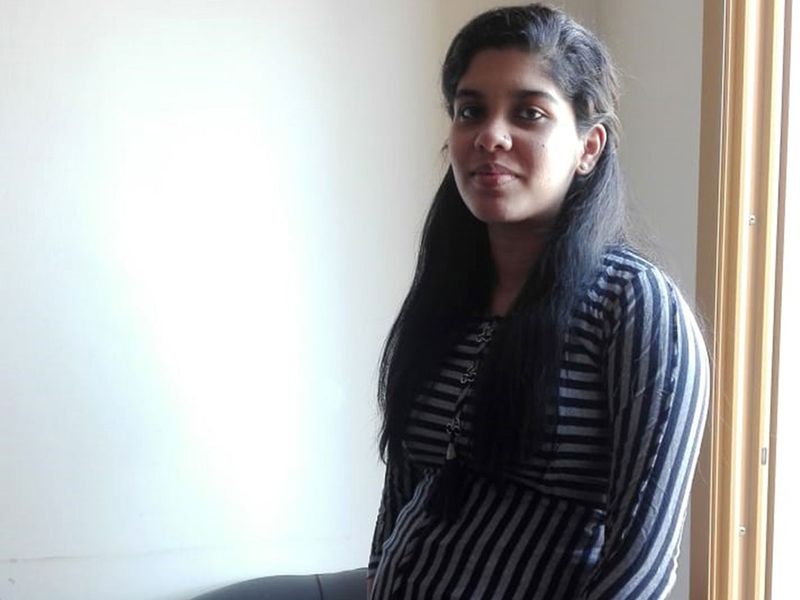
Image Credit: Supplied
She and her husband Nithin Chandran, who stood by her in her fight to fly home, were finally relieved when she was shortlisted by the Indian Consulate in Dubai and managed to get a ticket on the Air India Express Dubai-Kozhikode flight on the first day of VBM on May 7, 2020.
Though the case she had filed had no desired impact, Athira, an electronics and communication engineer who worked with an IT equipment company, had managed to get a ticket on the first repatriation flight from Dubai after the then Consul General of India in Dubai, Vipul, gave a high priority to her case since she would not have been able to travel later due to the advanced stage of pregnancy.
However, Athira’s happiness of reaching home was short-lived after Nithin, an engineer who had turned 28 on June 2, died in his sleep due to cardiac arrest, exactly a month after he saw her off from Dubai International Airport. Athira giving birth to a baby girl through a caesarean section without being aware of Nithin’s passing, and then seeing him lying motionless in a coffin in an ambulance at the parking lot of the hospital the next morning, had been widely reported by media in India and the UAE, including Gulf News. “She has not recovered from the tragedy yet,” Nithin’s father Ramachandran told Gulf News on Friday.
Though the arrival of her daughter Adithi, who will turn one on June 9, was a relief for her and Nithin’s family, Ramachandran said Athira has not been able to go back to her old self. “She rarely talks to people. She doesn’t attend phone calls at all. Even with her brother, she only chats on WhatsApp.”
Dubai memories
Friday brought back memories of Nithin bidding goodbye to her at the Dubai Airport and she was more upset, he said. “All of us are really upset today. Even the weather is very gloomy. She has been living with us and goes to her house occasionally. Today she wanted to go to her parents and I dropped her home. She might feel better there,” said Ramachandran.
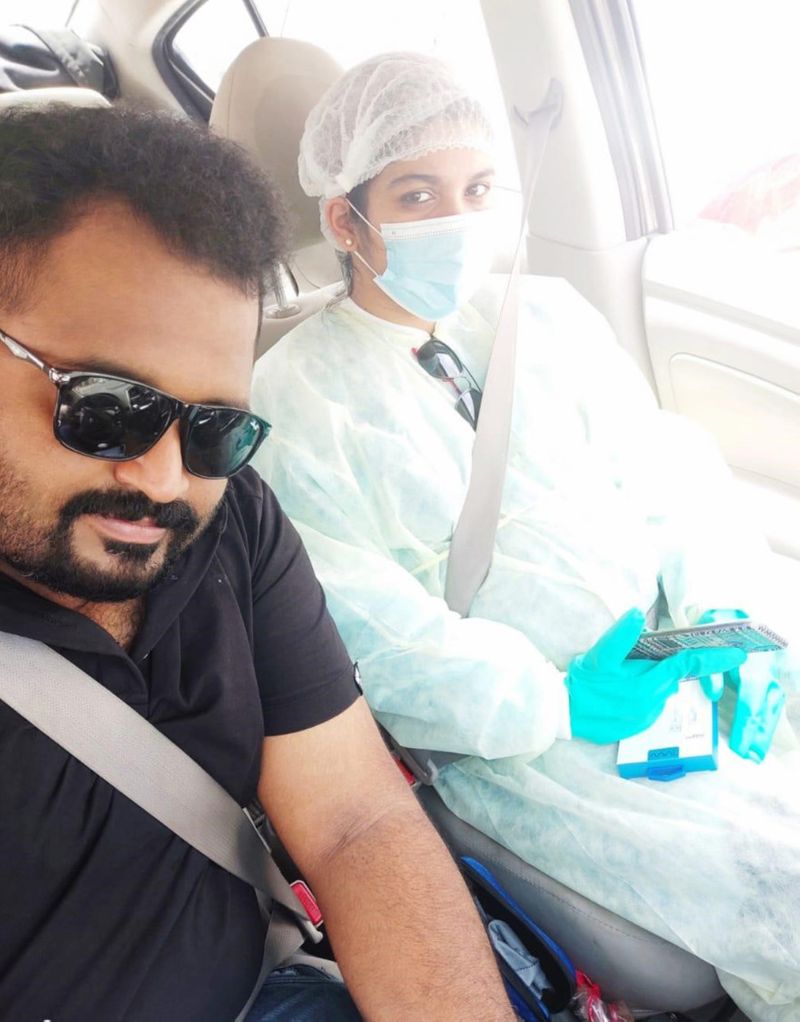
Image Credit: Supplied/Gulf News Archives
Memories of Nithin, who was immensely popular back home and among the Keralite expat community due to his selfless volunteering work especially in blood donation and during the pandemic, will be etched in the minds of people who knew him.
For the very reason, his father said, Athira finds it difficult to face people in the locality. “I honestly feel that going back to Dubai will help her overcome this depressive state. I hope she can fly after this pandemic situation and she would get some good job over there. I want to see a bright future for her and my granddaughter,” Ramachandran added.
Ambily is back with baby
Ambily Babu, 27, was another pregnant woman who flew on the first day of VBM from Abu Dhabi to Kochi, which became the first COVID-19 repatriation flight to land in India.
Though hers is an entirely different story, Ambily was also feeling low on Friday, thinking about Athira, Nithin and their child, she told Gulf News. “When I think about our repatriation, I can’t forget Athira’s story. Also, I happened to see a Facebook post about Nithin last night. I was restless and couldn’t sleep properly thinking about them,” said Ambily who is now back in Abu Dhabi.
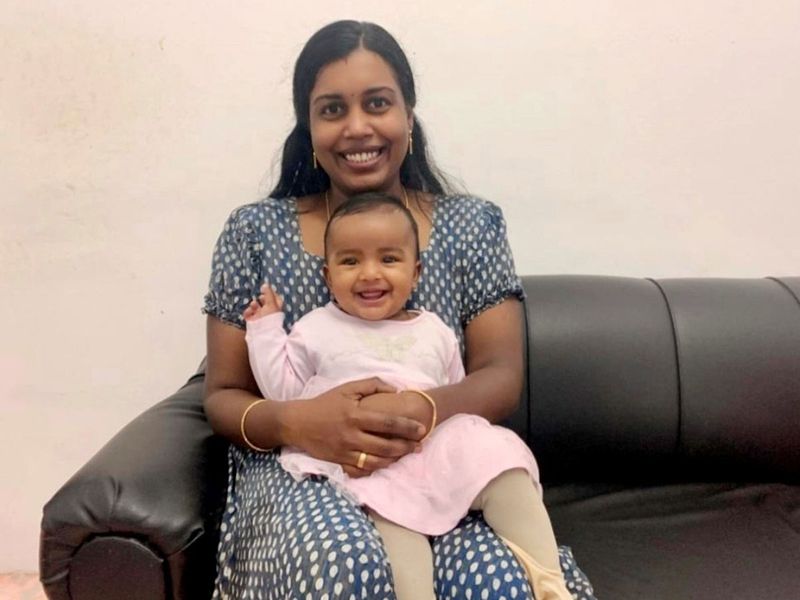
Image Credit: Supplied
Athira and Ambily were among thousands of pregnant Indian women who applied for repatriation for delivery back home. On May 16, a record 75 pregnant women in the final stages of their pregnancy were flown on a repatriation flight from Dubai to Kochi. Like Ambily, several of them have flown back with their newborns to the UAE months later.
“I delivered on August 7 and came back to the UAE on September 28,” said Ambily. Her daughter Isha Manu is nine months now and also gets the care of Ambily’s mother who also came along with them.
Flying with baby amid pandemic
Flying with the baby during the pandemic, however, was not a great experience, said Ambily. “Since my mother was on a visit visa, we had to fly to Sharjah and then travel by road to Abu Dhabi. My baby also had to take PCR test on arrival. My husband came to pick us up. At the Ghantoot border, we were tested again and the three of us [passengers] were taken in a bus to the quarantine centre at the [Emirates] Humanitarian City in Mussafah.”
During the three-day quarantine period, she said the child developed high temperature. “The facilities there were excellent. Doctors were available for phone consultation. She was cured with paracetamol.”
Ambily, a former teacher with a postgraduate degree in IT, is now looking for an employment opportunity as her job with an Abu Dhabi school was made redundant after classes moved online due to the pandemic.
One of the first to fly home
Sharjah resident Muneeruddeen. K, his wife and three of their four children were among the first families who flew home on the first day of VBM. Muneeruddeen had to take the tough call of leaving the UAE, which he called home for 26 years, for good, after he consecutively lost two jobs in one year.
However, after spending some months back home, Muneeruddeen realised that his future would still be better back in the UAE. “My visa was not cancelled. December 31 was the deadline [which eventually got extended to March 31] for people who stayed outside for than six months to return. So, I came back on December 29,” said Muneeruddeen, who once again made Sharjah his home.
Chasing new dream
Around two months back, he started his own business venture in Dubai’s Oud Metha — a luxury laundry service using wet cleaning technology and targeting upper class clientele. “I didn’t look for any jobs in Kerala. I enjoyed the time back home after we finished our 14-day institutional quarantine. It took time to get closer to people, who didn’t know me well, because back then they were all concerned about expats spreading the coronavirus though we had tested negative after the quarantine period.”
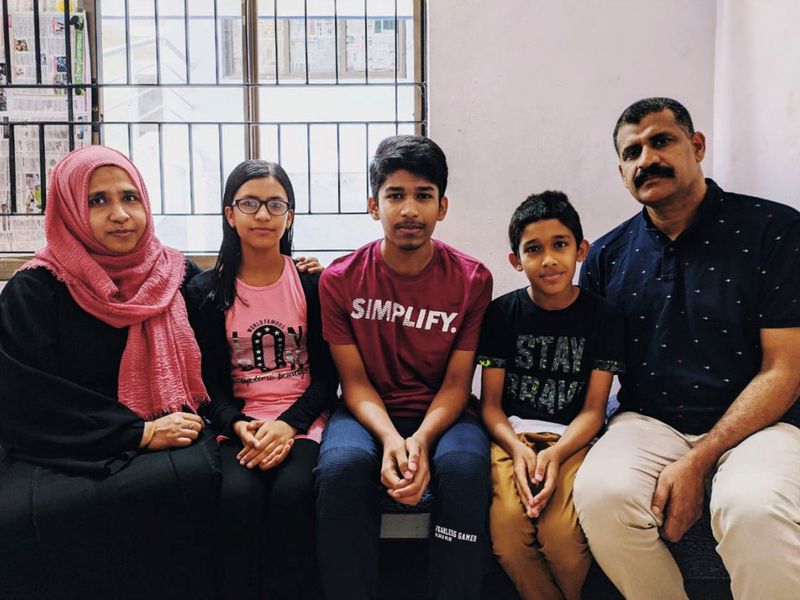
Image Credit: Supplied
“Anyhow, I went out regularly and made people feel comfortable. I enjoyed playing badminton, gardening and reading and had a good break back home after 26 years of expat life.”
He wishes to bring his family back here once his business is on track as his young children still want to study here though they are happy with everything else back home. “I still remember the frantic calls that people had to make for flying back to India when we were seeing a spike in COVID-19 cases here. But, the situation is worse over there now. Now people want to bring their families here. I never expected this pandemic to become worse. I thought we would live with it with the new normal in place and would soon overcome it with vaccines and medicines. Anyhow, now I also want my family to be back here soon.”
Settling back home
In June last year, young fashion designer Jahir Mohammad Harun, who goes by the name Zaheer Mohammed at work, had spoken about his dream getting shattered after his new job in Dubai was affected due to the pandemic.
His wife had given birth to their second son in April 2020 while he remained jobless here. With very few repatriation flights to Maharashtra those days, he was one of the thousands of stranded Indians from the state who were begging for more flights home back then.
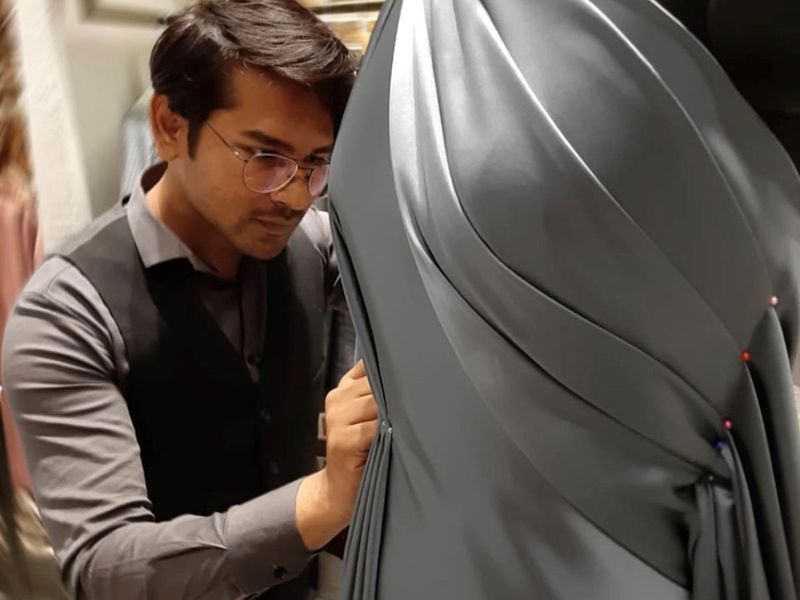
Image Credit: Supplied
After managing to catch a repatriation flight to New Delhi in July, Zaheer is now settled back in his hometown Pune. “I started a new boutique making designer outfits in December. But due to the lockdown, my business has been affected and the workers who were associated with me have also become jobless.”
However, Zaheer chose to remain optimistic even amid all the pandemic-related miseries around him. “I’m happy to see a new beginning. It was a nice feeling to work for your own label. This [peak of pandemic] is just a temporary phase. I am sure we will overcome this soon,” he said.
We want to return
Fazna Ikram, who returned home on a VBM flight on May 26, 2020, said she wanted to return to the UAE soon. “The UAE is my second home. I have done my high schooling there and I lived there for 15 years after my marriage,” said the mother-of-two, who owns a demolition company here.
She had to fly home due to some health issues and her husband, who is a banker, also had to follow after losing his job. “My company is still there. One of my partners is handling it now. We are now hoping for the best. I want to come back when the flight suspension ends. My husband will also come along with me,” she said.
‘We don’t want to go’ stories that went viral
A few others, whose stories were published by Gulf News, preferred not to be written about again as their repatriation stories had gone viral last year. They included a stranded visitor, whose family was helped by several Gulf News readers, and a young widow, who had to fly home with her husband’s mortal remains on a repatriation flight.
- Pregnant woman, who moved India’s apex court to fly home, among first to be repatriated
- COVID-19: First repatriation flights carrying Indians from UAE land in Kerala
- Funeral held for Indian expat who died in Dubai a day before his repatriated wife gave birth in Kerala
- Send more repatriation flights or start commercial service, stranded expats in UAE tell Indian government
- Kerala mum lost unborn child and a leg in Air India Express Dubai-Kozhikode plane crash. She is still in hospital
They were all faces of stranded Indians who rushed home during the pandemic. However, respecting their privacy, Gulf News is refraining from writing from their current details, which they shared off the record.
VBM crash that can never be forgotten
However, recapturing the VBM repatriation from the UAE cannot be complete without writing about the crash of the VBM flight IX1344 on August 7, 2020.

Image Credit: Supplied/Gulf News Archives
Gulf News had done a series of stories highlighting the agony of the families of the deceased victims and the plight of the severely injured passengers including children.
Once again, we spoke to Abdul Rasheed, whose wife Thajina K.P is still undergoing treatment after several surgeries following the crash in which she lost her four-month-old unborn child and a leg and sustained multiple injuries. “We have lost count of the number of surgeries she has undergone. The last one was on March 18 this year. I had gone home and had to fly back on April 3 though she was still in the hospital. She was finally discharged on May 3,” he said.

Image Credit: Supplied/Gulf News Archives
Their 11-year-old son Muhammed Hisham, and seven-year-old daughter Hadiya were also severely injured in the crash with multiple fractures. “My son has slowly started walking. My daughter still has to do a surgery for removing the steel rod in her leg,” said Abdul Rasheed.
The scar left behind by the crash has not been healed for the affected families. Many of them, including Thajina’s, have also come together for a legal battle for higher compensation from the airline.
Abdul Rasheed said they have pinned their hopes on a UAE court where the families have filed a petition as they were concerned that Air India Express would not allot the compensation that they deserve as per the Montreal Convention. “We are also expecting the airline to come forward for a negotiation,” he added.
Like Our Facebook Page For Latest News